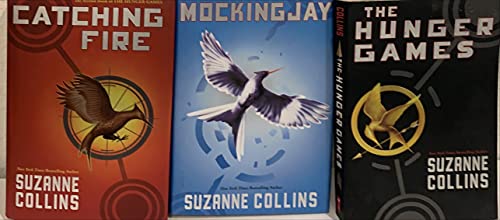Catching Fire and Mockingjay: Critiquing the Sequels
Catching Fire and Mockingjay: Critiquing the Sequels
by: Luke Fahnestock
(Spoilers ahead)
In one of my previous blogs reviewing the Hunger Games, I mentioned that the first book was my favorite, and the other books were not as enjoyable. I have decided to make a follow up post critiquing the second and third books in the Hunger Games series, Catching Fire and Mockingjay.
In general, both Catching Fire and Mockingjay pale in comparison to the original Hunger Games. The plot of the first Hunger Games is exciting and new for a reader that has never encountered the series before, but the sequels fail to replicate this vital attribute. The obvious way to continue the Hunger Games series was to create scenarios where Katniss and/or Peeta would have to fight for their lives in the arena a second and third time, but Suzanne Collins does not initiate this strategy in the most effective way. Catching Fire does create a somewhat different scenario to set up the 75th Hunger Games, but in the end it just feels like a slight edit of the 74th Games. However, I do appreciate the fact that Collins lets readers see the Games from a different tribute perspective. Katniss and Peeta become more like career tributes, gaining all the advantaged positions of career. Readers get to experience a dynamic of teamwork that was not present in the previous book. But besides those slight differences in the Games, the plot is relatively lackluster. I Suppose one could argue that there is substantial development in the Katniss, Peeta, Gale love triangle, but I was never really a fan of the complicated romantic aspect of the series anyways. To be honest, Catching Fire feels like one of those “middle of the series” books that exists solely to advance the plot just enough to set up the finale.
Now it is time to look at the last book, Mockingjay. This final installment in the series does not wrestle with the exact same problems as its predecessor, but it still shares some common weaknesses. Usually, one would expect the last book in a series to be action packed, fast paced, and thrilling, and that should be true of Mockingjay, because it is quite literally set in the middle of a full scale war. But it turns out that Katniss, along with the readers, will be viewing this entire war from the sidelines. Apparently, Katniss has been demoted from a master of combat and survival to an actor sitting back and filming propaganda videos. And yes, I know, this all had its strategic purpose, but would giving an action book a plot with actual action be too much to ask? The new perspective this book takes could be viewed as a way to put the tributes in the position of spectators of the Games. They were forced to watch the war play out before them, just like spectators were forced to watch the carnage of the games unfold. Some may find this new point of view engaging, but personally, I did not pick up the book hoping to read a behind the scenes military strategy guide. However, the story does not have a complete lack of action. Near the very end, all of our favorite characters finally partake in the siege of the Capitol. The plot gets better, but unfortunately it is still not great. The way that the capitol chose to defend itself was……. mind-numbinly stupid? They chose to fortify the city with a labyrinth of the same pods (traps) that were used in the Hunger Games instead of actually building an effective defense. Of course, these traps are deadly, but they can be avoided/escaped/foiled with the right amount of skill. President Snow knew that there was a good possibility that a squad composed of former tributes would be attempting to infiltrate the city, so why would he rig the city with traps that his enemies were so adept in outsmarting. I realize that this is an attempt to bring the story full circle by including this “76th” Hunger Games, but it seems like an illogical way to do so. I have several other small complaints about the very ending of the book, but I do not want to completely spoil the ending for those who have not read the full series yet.
To sum it all up, I would just say that the Hunger Games sequels are nowhere near as good as the first book. I probably made them sound a lot worse than they actually are, because in reality they are still decent books. And at the end of the day, I still absolutely love Suzanne Collins’ work, and I could never in a million years have written a better continuation of the series.

I agree, there are a large number of plot holes, unnecessary plot expediency, and kind-of nonsensical deaths, particularly in the last book. That being said, if you don't think about it too hard, it is excellent. Good post!
ReplyDeleteI have never read any books in the series but based of your review I probably won't read any in the future, besides the original one. Good book review!
ReplyDelete